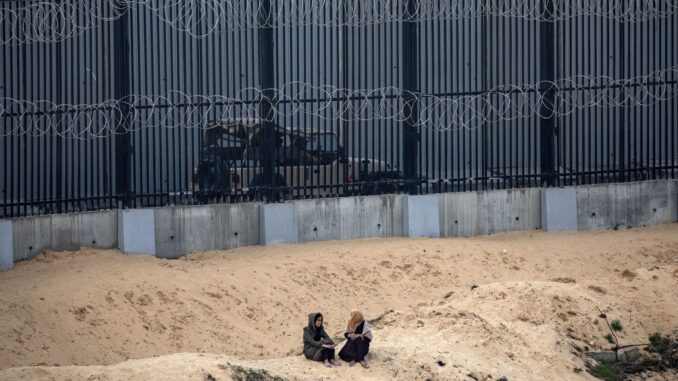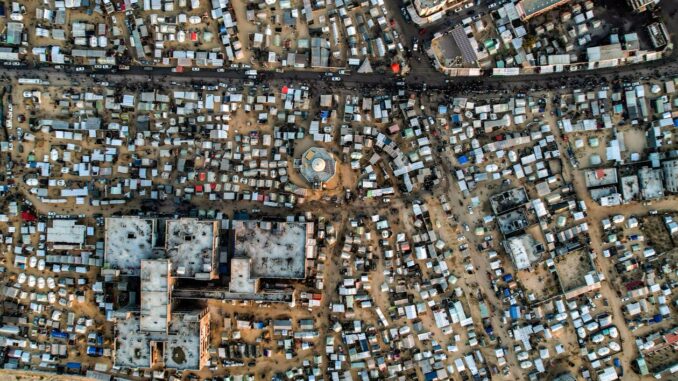A military operation along Gaza’s southern border would be tricky, with Egypt on one side and a million displaced Palestinians concentrated on the other
By Jared Malsin and Summer Said, WSJ

For Gazans, losing control of their southern border would roll back a symbol of Palestinian sovereignty. HAITHAM IMAD
Israeli leaders, including Prime Minister Benjamin Netanyahu, say Israel must have a grip on the border area, which the Israeli military calls the Philadelphi Corridor, to block Hamas from smuggling weapons into the strip. It is part of Israel’s strategy to defeat the Palestinian militant group and to prevent a repeat of its Oct. 7 attack on Israel that officials there say killed more than 1,200 people, mainly civilians.
“The Philadelphi Corridor has to be in our hands, it has to be closed,” Netanyahu said late last year. “It’s clear that any other arrangement won’t guarantee the disarmament that we want.”
Israeli officials have informed Egypt that they are planning a military operation along the Gaza side of the border, current and former Israeli officials and Egyptian officials said. The operation would likely involve removing Palestinian officials from a key crossing point and stationing Israeli forces along a stretch of land from Gaza’s southeastern corner abutting both Israel and Egypt toward the Mediterranean Sea about 8 miles to the northwest, the officials said.
For Israel, reclaiming the border region would strike a strategic blow against Hamas. It would allow Israel to block Hamas’s tunnels in the area, limit its flow of weapons, prevent its militants from escaping the Gaza Strip and remove any control the group has over the crossing point.
For Palestinians, it would roll back a symbol of Palestinian sovereignty. It could also open the door to Israel maintaining longer-term control over the border after the war, altering a security arrangement with Gaza that has existed for nearly two decades.
Egypt is concerned that an Israeli operation could infringe on the terms of a 1979 peace treaty between the two countries, which places limits on the number of troops both nations can place near the borders in the area. An Israeli military operation also risks accidentally doing damage inside Egyptian territory. Israeli officials say they are working to address those concerns by coordinating their plans for an incursion on the Gaza side with Egypt.
Egypt in recent days rejected an Israeli proposal that would involve stationing Israeli security personnel on the Egyptian side of the border for joint patrols with Egypt, saying it would breach Egyptian sovereignty. Egypt has told Israel it is bolstering the physical barriers on its side of the border and installing more watchtowers and surveillance cameras, but it won’t share surveillance feeds with Israel, Egyptian officials said.
Israeli leaders haven’t given a final go-ahead for an operation along the border and the timing of any operation will depend on negotiations with the Egyptian government, which is trying to broker a new agreement to free Israeli hostages held by Hamas in return for the release of Palestinian prisoners and a cease-fire in Gaza.
An offensive in the area will be complicated militarily due to the presence of more than a million Palestinian civilians who have fled the rest of the strip and have concentrated in the area. Most of them are packed into the city of Rafah adjacent to the border or camping in areas along the boundary.
Even a limited military operation to occupy a stretch of land a few hundred yards wide would require Israeli forces to push through Rafah city, which straddles the border, and areas where the displaced people have gathered in tent camps. Security analysts are concerned that such an operation would deepen the humanitarian crisis.
Displaced Palestinians have camped in Rafah, a city along Gaza’s border with Egypt. PHOTO: AGENCE FRANCE-PRESSE
More than 23,000 people have been killed since the war began, mainly women and children, according to Palestinian health officials. The numbers don’t distinguish between soldiers and civilians.
In response to questions about plans for a military operation in Rafah, an Israeli military spokesperson said the army “will strike Hamas wherever necessary” but declined to comment further on operational planning. Israeli military officials have said they would avoid a large-scale clearing operation in Rafah like the one they carried out in northern Gaza.
When Israel withdrew its soldiers and settlers from Gaza in 2005, it maintained control of Gaza’s airspace, territorial waters, and most of its border crossings—except for the one at Rafah. It relinquished control of that border crossing to Egypt, the Palestinian Authority and a European Union monitoring mission. The EU monitors left when Hamas seized control of Gaza in 2007, though Israel retained some influence over the border crossing by maintaining close security cooperation with Egypt.
Since Hamas’s Oct. 7 attack, Israel has played a greater role in vetting the entry of people and goods through the Rafah crossing, including approving the contents of aid trucks entering Gaza. But Israeli officials say they need greater oversight. They say Egypt hasn’t sufficiently clamped down on the group’s ability to move people and some weapons across the border, either using smuggler routes or via the border crossing.
“Israel does not want to be responsible for Gaza in the long term, but the question is how do you make sure that Gaza stays demilitarized?” said a senior Israeli military official. “It’s a real dilemma. The only way to control a geographic area is to control what’s going in and out.”
“Right now in the near term, in the next few decades, Israel needs to control the borders because of the security issues,” said the official.
Egypt says its military and intelligence services maintain tight control over the border area. Using diplomatic and security channels, Egypt has been pushing back on Israel’s plans in hopes that Israel will back down, Egyptian officials said.
An Israeli military plan under consideration by the government calls for Palestinian clan and family leaders to form local ruling authorities, according to Israeli officials. Some Israeli officials envision a regional or international security force eventually moving into Gaza, but no country has committed troops to such a force.
An American proposal, which faces opposition in the Israeli government, calls for the West Bank-based Palestinian Authority to take control. An Egyptian plan calls for the formation of a new Palestinian government that would include Hamas, an outcome that Israel also says it won’t accept.
The Rafah border has been at the heart of tensions between Israel, the Palestinians and Egypt for decades. In 2003 and 2004 Israel demolished hundreds of Palestinian homes along the borderline in what it said was an effort to clamp down on smuggling and militant activity.
After Israel withdrew from Gaza in 2005 and Hamas took control two years later, tunnels underneath the Gaza-Egypt border became the economic lifeblood of Gaza, with smugglers bringing everything from cars to weapons and deliveries of fast food from Egypt. In recent years, an Egyptian military operation aimed at stamping out Islamic State, along with an underground wall Egypt installed underneath its border with Gaza, curtailed the use of those tunnels, according to Israeli and Egyptian officials.
But Israeli officials say Egypt hasn’t completely cut off Hamas’s access to weapons, including some that they allege have come on vehicles via the official Rafah border crossing. Security analysts say any sustained Israeli military presence in Gaza, including along the Rafah border, risks a repeat of past Palestinian uprisings and armed insurrection.
“Will Gazans accept that?” said Tahani Mustafa, a senior Palestine analyst at International Crisis Group. “Especially when you’re talking about a population that has lost pretty much everything at this point and has nothing to lose.”
Carrie Keller-Lynn contributed to this article.
Write to Jared Malsin at jared.malsin@wsj.com and Summer Said at summer.said@wsj.com




Egypt is sustained by joebama they wont allow usrael to do what is necessary
Why is grabbing the Philadelphi corridor more difficult than Gaza city? If our peace partners in Egypt disturb the onging activities, they will have to very carefully distinguish between friend and foe before South Africa drags them in front of the ICC. Fixing this border is the most important thing right now to stop the influx of weapons etc. If the Egyptians show their true colors, they will try to continue the profitable smuggling operation by other means.
@Bear
Exactly so.
Kangaroo Court Run by Terrorists is Putting Israel on Trial
https://open.substack.com/pub/lel817/p/kangaroo-court-run-by-terrorists?r=1q2uiq&utm_campaign=post&utm_medium=web&showWelcome=true
I and many other people wrote during the withdrawal by Israel in 2005 that the IDF could not leave Gaza and not leave the Philadelphia Corridor because it was basically abandoning security.
It was obvious for many years this was a major security problem with always for rockets and better rockets being fired at Israel. Hamas going from a terror group into a full fledged terror army.
Israel must stay in Gaza period and militarily control it and all its borders.
“population that has lost pretty much everything at this point and has nothing to lose.” Umm how ’bout their lives? If they think their lives are nothing and decide to attack, they aren’t civilians anymore and their lives are forfeit. It doesn’t matter how many of them there are.
“More than 23,000 people have been killed since the war began, mainly women and children, according to Palestinian health officials. The numbers don’t distinguish between soldiers and civilians.”
Hamas “soldiers” don’t wear uniforms much so guess what? All the Muslim dead are soldiers or spies. Geneva Convention does NOT apply to them.